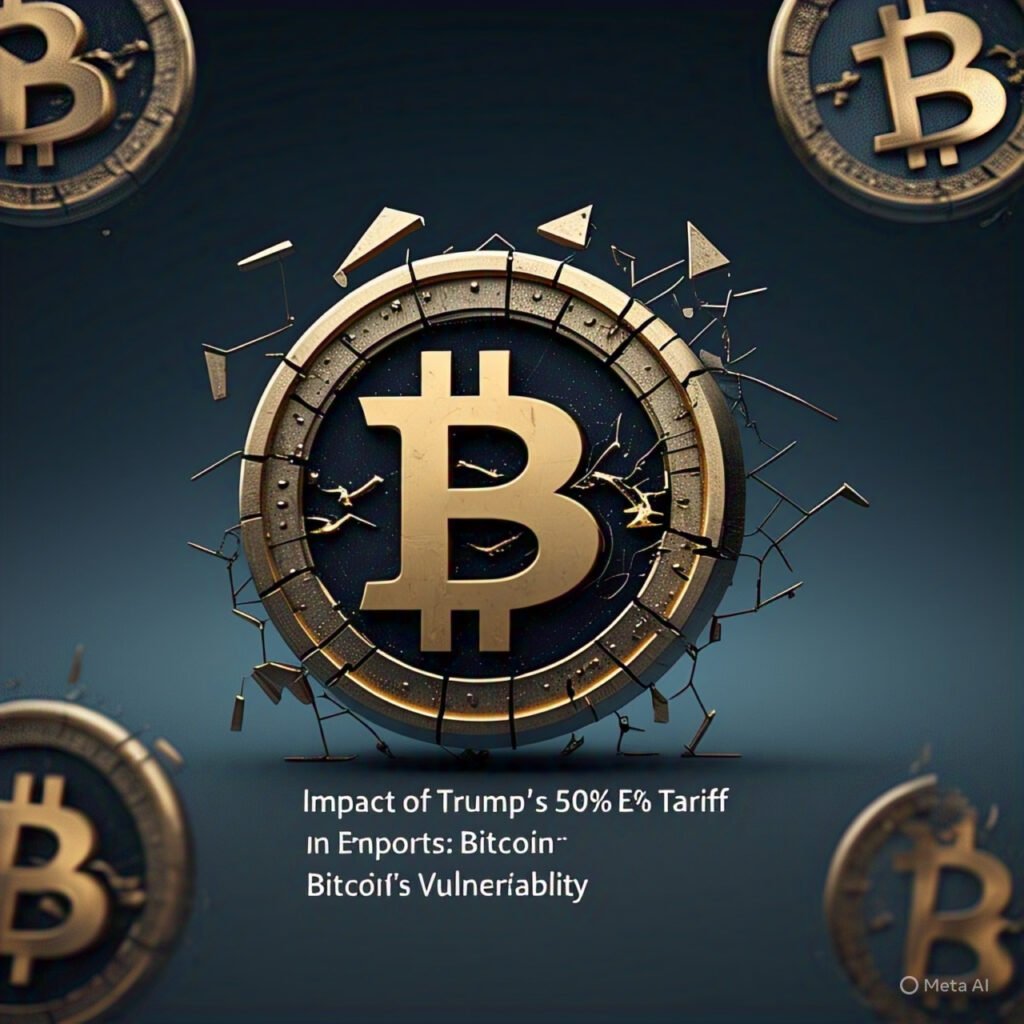In a world where geopolitical events regularly interact with the erratic dynamics of the Bitcoin Market, a significant change in economic policy can set off ripples affecting both conventional and digital financial assets. The declaration by former U.S. President Donald Trump, advocating a 50% duty on goods imported from the European Union (EU) beginning next month, attracted the attention of market analysts, investors, and bitcoin aficionados equally. Already influencing the value of Bitcoin and other cryptocurrencies, this audacious and divisive action has started debates on the possible consequences on the crypto market and world trade relations.
Bitcoin’s Vulnerability to Global Political and Economic Shifts
Although Bitcoin is often viewed as a counterpoint to conventional economic swings, it is still susceptible to the domino effect of global political and financial changes. Typically, several factors influence the value of Bitcoin, including macroeconomic trends, technological breakthroughs, investor sentiment, and legislative changes. Unexpected actions like imposing high taxes, however, can have an exaggerated effect on the price of the cryptocurrencies.
Should his tariff plan be passed, tensions between the United States and the European Union, two of the most significant global economic likely rise. The suddenness and scope of the suggested 50% tariff on European goods might throw off world trade flows, generate inflationary pressure, and increase uncertainty in international financial markets. These disturbances usually hurt risk assets such as Bitcoin, which is sometimes considered a speculative investment rather than a reliable source of value in times of crisis.

Although some supporters of cryptocurrencies contend that rising inflation and devaluation of money could help Bitcoin, past events have demonstrated that the market’s first response is usually instability when major worldwide events occur. When Bitcoin’s price declines in reaction to Trump’s tariff announcement, it highlights the complexity of relying on digital assets as a defense against political unrest.
Trump’s Tariff Proposal: Impact on U.S.-EU Trade and Bitcoin
Given the former President’s clear trade posture during his tenure, the news of Donald Trump’s tariff call has attracted notable attention in U.S.-European relations. Trump’s suggested tariff increase fits a larger agenda to correct trade disparities between the United States and the European Union. Such high taxes are intended to force the EU to renegotiate trade agreements with the United States, especially in sectors including steel, aluminum, and technology, thereby exerting pressure on it. Critical to the EU’s economy, these industries would see significant price increases, aggravating already existing trade conflicts.
Should the duties go into force, the EU will probably respond with its own taxes on American products, possibly sparking a full-fledged trade war. Trade conflicts often generate an unpredictable atmosphere, bad for established markets and new assets like Bitcoin. For investors in Bitcoin, this volatility is especially alarming, as the coin has historically shown great degrees of price swings in response to macroeconomic events.
Furthermore, the unknown aspects of these tariff policies influence investor mood. Investors can find safer havens for their money as the world economy prepares for possible trade interruptions. Given Bitcoin’s propensity for notable price swings during times of increased market volatility, this could lessen its appeal as a risk-on asset.
Bitcoin’s Vulnerability to Geopolitical and Economic Shifts
Many feel Bitcoin provides some degree of protection from government policies, inflation, and currency devaluation as it runs outside conventional financial institutions. Practically, though, Bitcoin’s value is typically rather sensitive to geopolitical events and macroeconomic changes.

Like any financial market, the bitcoin market responds to news on government actions, monetary policy changes, or changes in world power dynamics. Bitcoin becomes more vulnerable to significant geopolitical events as its liquidity rises and user base expands. The U.S.’s 50% tariff could set off a chain reaction influencing investor behavior in the crypto and conventional stock markets.
Moreover, Bitcoin’s Surge association with conventional financial markets implies it might follow suit should stock markets suffer falls for reasons including trade conflicts. Early in the COVID-19 epidemic, this was clear when the price of Bitcoin dropped significantly in line with conventional stock indices after the global economic concern.
Impact of 50% Tariff on EU Imports and Global Economy
A 50% tariff on European imports will probably cause significant economic disturbance if applied. Such a hefty duty could cause price increases for many EU imports, from luxury goods to essentials. These additional expenses can cause inflationary pressures in the United States and elsewhere, upsetting the markets. The U.S. dollar might lose part of its buying power if inflation increases, forcing investors to hunt for assets that might hold value.
Particularly in industries that depend on cross-border commerce, tariff increases may also damage world supply chains for sectors like consumer electronics and automobile production, which rely on a worldwide network of suppliers and distributors; supply interruptions or increased costs could arise. Such disturbances can cause general economic uncertainty, forcing conventional and digital asset markets downhill.
Final thoughts
Though Trump’s tariff call causes temporary price declines, it’s important to see the matter from a long-term perspective. Bitcoin’s special value proposition as distributed digital money is still strong, and eventually, the market will probably bounce back from these little setbacks.
Higher taxes, however, warn that Bitcoin is vulnerable to the vagaries of world politics and trade dynamics, much like any other asset. The larger geopolitical landscape will shape Bitcoin’s course in the following few years. Investors wishing to profit from Bitcoin’s potential should remain current with world economic events, especially in areas likely to cause significant volatility.


